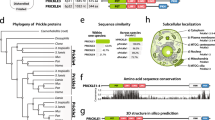Abstract.
Invertebrate organisms provide systems to elucidate the developmental roles of Janus kinase (JAK)/signal transducers and activators of transcription (STAT) signaling pathways, thereby complementing research conducted with mammalian cells and animals. Components of the JAK/STAT protein pathway have been identified and characterized in the fruit fly Drosophila melanogaster and the cellular slime mold Dictyostelium discoideum. This review summarizes the molecular and genetic data obtained from these model organisms. In particular, a Drosophila JAK/STAT pathway regulates normal segmentation, cell proliferation, and differentiation, and hyperactivation of the pathway leads to tumor formation and leukemia-like defects. A Dictyostelium STAT regulates the development of stalk cells during the multicellular part of the life cycle. Future research utilizing these organisms should continue to provide insights into the roles and regulation of these proteins and their signaling pathways.
Similar content being viewed by others
Author information
Authors and Affiliations
Rights and permissions
About this article
Cite this article
Dearolf, C. JAKs and STATs in invertebrate model organisms. CMLS, Cell. Mol. Life Sci. 55, 1578–1584 (1999). https://doi.org/10.1007/s000180050397
Issue Date:
DOI: https://doi.org/10.1007/s000180050397




